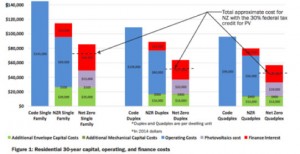Efficiency Vermont, an energy efficiency utility working to reduce energy usage and costs for Vermont homeowners and businesses conducted a Zero Energy Feasibility Study to determine whether net zero energy homes, multi-family homes, office buildings and a combined office/light manufacturing building made economic sense.
The study shows that net zero and net zero ready buildings are a smart investment when compared to code compliant buildings. This applies to all net zero building types when using financing for the additional capital costs without applying any rebates or incentives. The only the exception is office/manufacturing buildings. However, using a lower-rate SBA secured loan, Efficiency Vermont incentives, and the federal solar tax credit, office/manufacturing buildings also prove to be a better investment than similar code-built buildings. To boot, savings continue to accumulate beyond the 20-years shown in the study’s analysis.
The residential analysis, in the chart below, shows that net zero is a better investment than a similar code-built home, even before rebates or incentives – both in the first year and over the 30-year loan period. When additional capital costs for energy efficiency and photovoltaics are financed net zero ready and net zero residential buildings cost less to own and operate than code buildings for single-family and multifamily residents.
The cost benefits are clear. Building to net zero energy standards saves money beginning from day one and well into the future.

